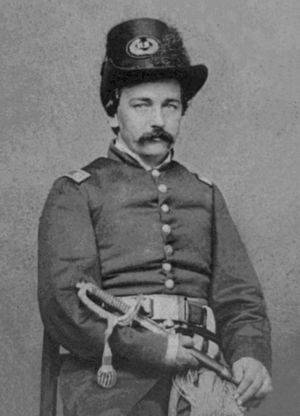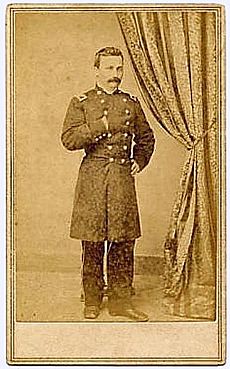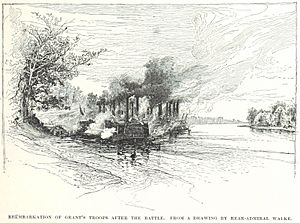William S. Hillyer facts for kids
Quick facts for kids
William S. Hillyer
|
|
|---|---|

Hillyer in 1861, in Colonel's uniform
|
|
| Birth name | William Sillman Hillyer |
| Born | April 2, 1831 Henderson, Kentucky |
| Died | July 12, 1874 (aged 43) Washington D.C., U.S. |
| Buried |
Mount Pleasant Cemetery, Newark, Essex County, New Jersey, US
|
| Allegiance | United States |
| Service/ |
United States Army |
| Years of service |
|
| Rank | Colonel, (U.S.), Brevet General |
| Commands held | • Mustering Officer • Colonel of Volunteers • Provost Marshall General of the Dept. of the Tennessee |
| Battles/wars | American Civil War : • Battle of Fort Donelson, • Battle of Vicksburg • Battle of Shiloh • Battle of Appomattox, |
| Spouse(s) | Anna Rankin |
| Children | Six |
William Sillman Hillyer (born April 2, 1831 – died July 12, 1874) was an American lawyer. He became a high-ranking officer in the Union Army during the American Civil War. Before the war, he met Ulysses S. Grant in St. Louis. Hillyer served closely with General Grant during the war. He was with Grant at important battles like Battle of Fort Donelson, Battle of Shiloh, and the Siege of Vicksburg.
Hillyer was one of the first people to join General Grant's personal staff. He was also the last surviving member of that original group. After the war, he worked for the government under Presidents Andrew Johnson and Grant. He also tried to get involved in politics in New York, but he was not successful.
Contents
Early Life and Education
William Hillyer was born in Henderson, Kentucky. His father, James, was the postmaster there. His mother, Catherine, was related to Benjamin Silliman, a famous scientist and teacher at Yale University.
Hillyer lost both his parents when he was young. He and his older sister, Elizabeth, then went to live with their aunt in New Albany, Indiana. In 1847, he graduated from Anderson University. He also studied at Yale University in 1848 and 1849.
In 1850, Hillyer studied law at Indiana State University. He became a lawyer in Indiana in 1851. He worked as a lawyer in New Albany and was even the city's attorney. For a short time in 1855, Hillyer served in the Indiana House of Representatives. He married Anna Rankin, and they had six children. Two of their sons were named after Generals Grant and Rawlins.
Meeting Ulysses S. Grant in Missouri
In 1855, Hillyer moved to St. Louis, Missouri. There, he started a law firm called McClellan, Hillyer, and Moody. It was in St. Louis that he met Ulysses S. Grant. Grant was renting office space from Hillyer's firm.
Hillyer also supported Grant when Grant tried to become the St. Louis County engineer. The two men shared office space and often talked about the big issues that led to the Civil War. Hillyer also continued to practice law in St. Louis.
Military Service in the Civil War
In 1861, William Hillyer joined the Union Army as a private. He was there when Camp Jackson in Missouri was captured on May 10. After this, he moved to New York to practice law.
Soon, Ulysses Grant became a general. In August 1861, Grant asked Hillyer to join his staff as a captain. Grant wrote to his wife that Hillyer was one of the "cleverest men...anywhere." On October 4, Hillyer was made the Mustering Officer for the district in Cairo, Illinois. This meant he helped gather new volunteer soldiers.
Battle of Belmont
At the Battle of Belmont on November 7, 1861, General Grant's horse was shot. Hillyer quickly offered Grant his own horse so Grant could keep leading his troops. During the retreat after the battle, Grant was looking for a missing group of his soldiers. When he got to the river, the boats were already leaving.
Grant later wrote about this moment: "The captain of the boat that had just pushed out recognized me and ordered the engineer not to start the engine: he then had a plank run out for me. My horse seemed to take in the situation. He put his fore feet over the bank without hesitation or urging, and, with his hind feet well under him, slid down the bank and trotted on board."
Fort Donelson and Famous Words
In February 1862, Hillyer was a Colonel on General Grant's staff during the Battle of Fort Donelson. On the last day of the battle, Hillyer wrote down Grant's famous words: "No terms except an unconditional and immediate surrender can be accepted. I propose to move immediately on your works." Hillyer personally delivered this message to the Confederate commander, General Simon Bolivar Buckner.
After the battle, Colonel Hillyer and General Lew Wallace had a disagreement. Wallace's report on the battle said he didn't see Hillyer or Grant's other aides on the battlefield. Hillyer disagreed and later said Wallace's report made his own actions seem more important than they were. He also accused Wallace of being cowardly, but Wallace was later cleared of this charge. In his own report, General Grant praised Hillyer and other aides for their bravery during the battle.
Promotions and New Roles
In April 1862, Governor Hamilton Gamble of Missouri made Hillyer an aide-de-camp. This meant Hillyer was a personal assistant to a general. He was promoted to Colonel of Volunteers on May 3, 1862. In May, Hillyer also became an assistant aide-de-camp for Major General Henry W. Halleck.
On June 24, Hillyer was again made Provost Marshal General of the Department of the Tennessee. This gave him authority over different areas in Mississippi, Tennessee, and Kentucky.
Battle of Shiloh
Hillyer served under General Grant as an aide at the Battle of Shiloh. Grant sent Hillyer to St. Louis to ask General Halleck for permission to attack the Confederate army at Corinth. Hillyer returned with bad news: Halleck had said no to Grant's plan.
On the first day of the battle, Hillyer saw many new Union soldiers running away. He later wrote: "We met hundreds of cowardly renegades fleeing to the river and reporting their regiments cut to pieces. We tried in vain to rally and return them to the front." On the third day at Shiloh, General Grant ordered Hillyer to lead a group of soldiers in a charge against the Confederates. This charge helped turn the battle in favor of the Union.
When the newspapers criticized General Grant for the many soldiers lost at Shiloh, Hillyer defended Grant in a letter to Grant's father. He said the false stories were spread by the soldiers who ran away. Hillyer's letter and a letter from Grant to Hillyer were later published in the Cincinnati Commercial newspaper. Hillyer later served with Grant during the Tennessee and Vicksburg military campaigns.
Later Service and Retirement
On May 15, 1863, Hillyer left the army because he was not well. He went back to New York. In March 1865, he was given the honorary rank of brigadier general. In June, he led a large reunion of the Army of the Tennessee.
After the war ended, President Grant appointed Hillyer as a revenue agent. This job involved collecting money for the government. Later, in 1874, he was nominated for a position in the customs house, but his name was withdrawn due to strong opposition. Hillyer was the last surviving member of General Grant's original staff.
Political Life
In 1868, President Andrew Johnson appointed Hillyer as a U.S. revenue agent. When Congress ended this position, Hillyer worked as a lawyer for the Commissioners of Immigration.
In 1871, Hillyer was considered for several political jobs in New York. These included president of the New York Board of Commissioners, general appraiser at the New York Customs House, and naval officer. However, Senator Roscoe Conkling opposed his nominations, so he did not get these jobs.
Death
William Hillyer died in 1874 at the age of 43 in Washington, D.C.. He passed away from lung congestion. During the last three weeks of his life, while he was sick in bed, President Grant visited him every day.
Images for kids
 | William L. Dawson |
 | W. E. B. Du Bois |
 | Harry Belafonte |







